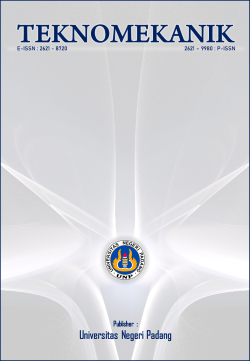Effectiveness of development of diva learning management system models on Algorithm and Programming Mathematics Course
DOI:
https://doi.org/10.24036/jptk.v3i2.7123Keywords:
DIVA Learning Management System, Learning model, Algorithms and programming courseAbstract
The development of the DIVA Learning Management System learning model is an increase in student understanding based on problems because learning algorithms and programming is indicated to be low in students' understanding that is abstract in the subjects of algorithms and programming. For this reason, the purpose of this study is to develop a DIVA Learning Management System model that has effectiveness. The methodology used is quasi experimental design in the form of nonequivalent pretest-posttest control group design. This study found the DIVA Learning Management System learning model with the syntax: a) Display; b) Information Search; c) Virtual Problem Solving; and d) Appraisal, and products from: (1) DIVA learning management system learning model (2) learning tools; (3) modules; and (4) learning media. Analysis of research data shows the learning model DIVA Learning Management System In the effectiveness test of media use for lecturers 92.3% is effectively used and for student learning outcomes with pre-test and post-test test scores can be seen from the achievement score of each respondent. The gain score results indicate the achievement score is at the level of 0.486 with the interpretation that overall an increase in scores after being given treatment to respondents. Based on the results of the data analysis above, it can be concluded that the model developed meets the feasibility to be used.
Downloads
References
Aptikom. 2016. Naskah Akademik Kerangka Kualifikasi Nasional Indonesia (KKNI) Bidang Ilmu Komputer dan Informatika. Tim KKNI APTIKOM Pusat.
Areias C. M., A. J. Mendes & A. J. Gomes. 2007. Learning to Program with Pro Guide, In International Conference on Engineering Education–ICEE 2007. Portugal: Coimbra.
Arends, R I. 2012. Learning to Teach, Ninth Edition. New York: McGraw-Hill.
Jenkins, T. 2002. On the Dificulty of Learning to Program, 3rd Annual LTSN ICS Conference, Lough borough University. http: //www. ics. heacademy. ac. uk/Events/conf2002/tjenkins.pdf, Last.
Kagermann, H., Lukas, W.D., & Wahlster, W. 2011. Industrie 4.0: Mit dem Internet der Dinge auf dem Weg zur 4. Industriellen Revolution. http://www.vdinachrichten.com/Technik-Gesellschaft/Industrie-40Mit-Internet-Dinge-Weg-4-industriellen-Revolution, Diakses pada 17 Juni 2017.
L. S. Muchlis, K.Rukun, Krismadinata, dan Yahfizham. “A New Model Mobile Learning Management System Based On Moodle In University". 2017 Conference.unp.ac.id/ index.php/ ICTVET /4thictvet 1 (1), 487-491.
Lahtinen, E. 2006. Integrating The Use of Visualization to Teaching Programming. Methods, Materials and Tools for Programming Education.
McGill, T. J. & Volet, S.E. (1997). A conceptual framework for analyzing students’ knowledge of programming. Journal of research on Computing in Education. 29(3), 276.
Meltzer, D. E. (2002). The Relationship between Mathematics Preparation and Conceptual Learning Gains in Physics: A Possible “‘Hidden Variable’” in Diagnostic Pretest Scores. American Association of Physics Teachers, 1259–1268.
Murhaini, Suriansyah. 2016. Menjadi Guru Professional Berbasis Teknologi Informasi dan Komunikasi. Yogyakarta: Laksbang Pressindo.
Pepkin, K. L. 2004. Creative Problem Solving In Math. http://www.uh.edu/hti/cu/2004/v02/04. Diakses tanggal 24 Februari 2020
Roeßling G., (2010), A Family of Tools for Supporting the Learning of Programming, Algorithms 2010, 3, 168-182.
rsoy, H., Madran, R.O. ve Gülbahar, Y. (2006). Programlama Dilleri Öğretimine Bir Model Önerisi: Robot Programlama. Akademik Bilişim Konferansı, Kütahya
Syah, M. (2003). Psikologi belajar . Jakarta; PT Rajakrafindo Persada
Tan, P., Ting, C., & Ling, S. (2009). Learning difficulties in programming courses: Undergraduates’ perspective and perception. International Conference on Computer Technology and Development, 42-46, Kota Kinabalu, Malaysia.
Tuparov, G., Tuparova, D., & Jordanov, V. 2014. Teaching Sorting and Searching Algorithms Through Simulation-Based Learning Objects in an Introductory Programming Course. Procedia-Social and Behavioral Sciences, 116, 2962–2966. https://doi.org/10.1016/j.sbspro.2014.01.688.
Winslow, L.E. (1996). Programming pedagogy – A psychological Overview. SIGCSE Bulletin, 28, 17-22.
Zhou, K., Taigang L., & Lifeng, Z. (2015). Industry 4.0: Towards future industrial opportunities and challenges. In Fuzzy Systems and Knowledge Discovery (FSKD), IEEE 12th International Conference, pp. 2147-2152.
Downloads
Published
How to Cite
Issue
Section
License
Copyright (c) 2020 Lita Sari Muchlis, Kasman Rukun, Krismadinata Krismadinata

This work is licensed under a Creative Commons Attribution 4.0 International License.





